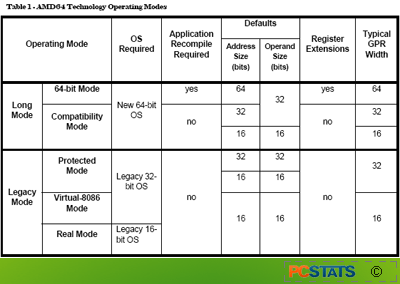Though you would imagine that a
similar, if lesser boost would be given to 32-bit executables running on a
64-bit operating system as there would be more memory space to go around, this
did not seem to be the case in our tests. A look at the AMD64 white papers
confirmed that these registers are available when the processor is running in
pure 64-bit mode only.

The future of 64-bit - Microsoft support has yet to
arrive
The first half of 2005, to be
(in)exact. That's when the boys from Redmond say that 64-bit versions of Windows
XP and Windows Server 2003 will be available. Until then, Windows users will
have Microsoft's beta 'x64 Edition' 64-bit port of WinXP for the Athlon 64 and
Opteron to play with.
Microsoft had previously
released a different, fully 64-bit version of the operating system which was
designed to work with Intel's Itanium line of 64-bit processors. Since the
Itanium doesn't play nicely with other 64-bit chips, neither unfortunately does
this OS.
Despite the valiant arguments
of Linux enthusiasts, 64-bit operating systems for the home desktop do not exist
until Microsoft says they do. It's inevitable that if and when the 64-bit OS
revolution happens, Microsoft products will be driving it.
That said, there's likely to be
at least 6 months before we see the official 64-bit version of Windows XP. In
this time frame, we'd imagine that the majority of CPUs being sold by AMD will
be 64-bit Athlons or Opterons. This could well drive the popularity of 64-bit
capable Linux applications through the roof and create a real alternate option
for 64-bit systems.... but we doubt it.
This brings us back to waiting
six months for the x64 edition of Windows XP. Of course, the beta version has already attracted
driver support from Nvidia and ATI, so it may well become a viable platform
before the official version is released.
Of course, the beta version has already attracted
driver support from Nvidia and ATI, so it may well become a viable platform
before the official version is released.
As for the far future, well
there is the next version of Windows, the OS currently code-named 'Longhorn'
slated to arrive in the first half of 2006. Longhorn will apparently be
available in 64-bit flavours from the get-go, so this doesn't give 64-bit XP
users much time to adapt to their brand new 64-bit version of XP before a newer
(probably better) product drops. It's the Windows ME/Windows 2000 dilemma all
over again (except Windows ME is an episode best purged from our collective
memories, but we digress.).
Benchmarking the Athlon 64 (again)
The AMD Athlon 64 processor is
capable of operating in three distinct modes: Legacy mode (for 32 bit operating
systems and apps), Compatibility mode (for 64 bit OS with 32-bit apps) and
64-bit mode (true 64-bit OS/applications). We thought it would be appropriate to
test the processor in all three modes with the same set of benchmarks in order
to see what the future might have in store for 64-bit adopters. Fortunately
there are several benchmarks available and even optimized for the Athlon-64
processor in either 32-bit or 64-bit operation.
As you will see, the majority
of the benchmarks on the following pages deal with the various math intensive
operations that tax the average processor from day to day, such as compression,
de-compression and encryption. Only one of them (the Nvidia one) can be
considered even slightly relevant to gaming. This is by design, since we wanted
to test the performance of the chip in its various modes, not the video card
drivers released for the XP x64 beta. So, let's get started!
